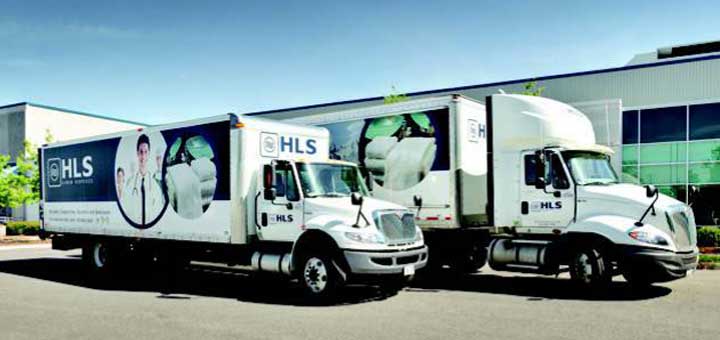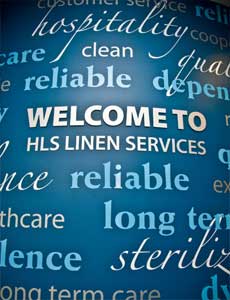Regent Care Center of Reno
An industry leader in laundry quality and service
HLS Linen Services was formed in 1974 in Ottawa, Ontario, by six area hospitals looking to reorganize their laundry operations. Rocco Romeo, the company’s current CEO, give an account of the company’s origins: “Back in that era, every individual hospital had its own on-premise laundry. An on-premise laundry is both capital-intensive and extremely labor-intensive. There’s also a lot of real estate that’s being taken up at each hospital. So the hospitals said, in a cooperative venture, ‘Why don’t we set up a co-op organization that handles all of the linen and laundry requirements for us, collectively?’” In this way, the hospitals reasoned that they could reap savings in labor, capital, and equipment costs, as well as in utility expenses, by using more efficient, centralized equipment.
The cooperative venture achieved all of those goals, and more. Today, HLS is an industry-leading, laundry service company that operates from a state-of-the-art, 185,000 square-foot facility. No longer organized as a co-op, the mature company now employs 220 full-time workers and another 180, part-time. Its ten-truck fleet services over 100 customers – 20 of which are hospitals – across many regions of Ontario and Western Quebec. Romeo recounts significant changes in HLS’s business model: “Back in 1974, when the company was set up, we were only doing four million pounds a year; we’re now doing 50 million pounds a year so there’s been some significant adjustment to different market segments. The geographical area that we service has expanded significantly, too – we’re shipping daily up to six hours away. And whereas we used to just be hospital-based, we also do nursing homes and long-term care facilities. We also do a lot of hospitality work, as well. We went out and we pursued different opportunities that were available.”
Taking advantage of those opportunities has propelled HLS’s growth over the last 41 years. The company’s services to its medical and hospitality customers, now include:
• Healthcare linen processing and supply
• Long term care
• Operating room linen
• Surgical pack sterilization
• Uniforms and lab coats
• Hospitality linen processing
• Mending and alterations
• Ambulance and forensic linen services
• Incontinent care systems
• Special events linen
• Table linens, napkins and other
• Food & beverage related linens
HLS is ISO 9001 registered and has been accredited by the Healthcare Laundry Accreditation Council (HLAC). “We’re the only one in Ontario, and only one of a couple in Canada that has that accreditation,” says Romeo, proudly. (The Healthcare Laundry Accreditation Council is a non-profit organization formed for the purpose of inspecting and accrediting laundries processing healthcare textiles for hospitals, nursing homes, and other healthcare facilities.)Romeo explains how HLAC operates: “They look at your processes in terms of best practices and standards for the laundry industry. It covers the gamut of processes from infection control to cleaning to transportation. So it’s a very dynamic standard to ensure that ultimately the customer is getting hygienically-clean linen.”
HLAC accreditation is only awarded to those laundries with the highest standards for patient safety and infection prevention. “It helps us in several ways,” states Romeo. “Number one, it’s voluntary, which means that we’re very proud of our company and the standards and processes that we have here. The accreditation validates our processes and our standards so our customers have assurance that the linen they’re getting from us is hygienically clean, which impacts patient safety. And at the end of the day, it always goes back to the patient and I think that’s a really important point.”
In addition to supplying its healthcare customers with the cleanest and safest linens available, HLS also offers significant cost savings to its many client hospitals, nursing homes, and acute care facilities. “The whole point of a co-op facility is it’s another area of savings. You’re centralizing and you’re standardizing your product mix, so that a bath towel that’s used today at one hospital might be used the next day at another hospital. There are efficiencies to be gained from that.” In addition, the fact that HLS owns its own linens (except for its hospitality clients) saves its customers from having to constantly buy and replace material; with a rental service, a customer has no capital outlays or replacement costs – it only pays a certain, fixed amount.
Another way that HLS saves its customers’ money can be found in the efficiency of its state-of-the-art laundry equipment, which allows the it to use a fraction of the energy normally consumed by an on-premise laundry. Lastly, HLS combines its water treatment and softening systems in order to reduce the use of chemicals in the wash process, cutting costs and increasing textile life.
Of course, as a centralized facility with over 100 customers, HLS must also employ a sophisticated computer system to make sure that the appropriate quantities of linen are being cleaned and sent out on a daily basis. Its average order fill rate of 99.9 percent speaks well of the company’s ability to meet its client’s critical needs, day-in and day-out. “We’re deemed an essential service for a hospital – like water and electricity,” explains Romeo. “So, we’re an extremely customer-focused and quality-focused company. And we’re extremely responsive; we make sure that all of our processes are geared towards ensuring that our customers get uninterrupted and high-quality service, every day.”
Providing for the vital needs of its clients – without interruption – is a bedrock principle of every medical laundry service. HLS meets that challenge with contingency planning that relies on equipment redundancy. “The common types of problems you’re going to run into in a laundry are equipment breakdowns,” says Romeo. “We have five tunnel washers, we have ten dryer lines, and we have five boilers. So if one of them goes down, we’re still able to operate. And if it is something major, we have back-up reciprocal arrangements with other laundries within a three to five-hour drive that could temporarily do our service.”
Romeo is bullish on the company’s future growth, as evidenced by what has already transpired over the last several years. “In 2003, we were doing zero hotels and zero hospitality. Twelve years later, we’re doing about 30 hotels. So it goes to show you that sometimes you can start with nothing and then, over time, you wind up developing a whole business.” HLS is also continuing to stay on the cutting edge of laundry technology. “Right now, we’re looking at a couple of things,” Romeo notes. “One capital expenditure is an automated garment system, and another is expanding the use of our RFIDs.” (RFID or Radio-frequency Identification is the wireless use of electromagnetic fields to transfer data, for the purposes of automatically identifying and tracking tags attached to objects. The tags contain electronically stored information.)
The company is also eager to expand its territorial spread as well as its market penetration. “There are still a lot of opportunities,” suggests Romeo. “The U.S., for example, presents a potential growth market that we haven’t really addressed, specifically. But our location here in Ottawa is 45 minutes from Ogdensburg, NY, two hours from Watertown NY, and three hours from Syracuse, and right now, we are servicing some U.S. customers. It’s never been a market that we’ve specifically gone after, but it definitely represents an opportunity. There are other markets emerging, and we’re going to look at them, as well.” Romeo notes that the company reaches out to prospective clients via trade shows, cold calls, and word of mouth within various trade associations to which it belongs.
When enticing a new customer to sign with HLS, Romeo stresses the practicality of partnering with a laundry service, while adding a touch of humor to his assessment: “When you’re at home, or anywhere else, one thing everyone hates to do is laundry,” he jokes. “And when you’re able to give that to somebody else – they wash it, they clean it, they process it, and then you get it the next day – that’s convenience and a lot of value.”
But in the end, Romeo knows that his business is a serious one and that in order to meet the laundry and linen requirements of its customers, while also maintaining a viable, professional, and diversified portfolio of clients, HLS must continually improve and innovate. He believes his company is up to the task. “I think, as a company, we take a clean, fresh approach to things,” he declares. “When we’re looking at any situation, we’re very service-oriented. When customers have a problem, we’re always looking for a solution. We’re very progressive and forward-thinking. We’re leaders in terms of finding new solutions to problems. We’re technologically advanced, both within our systems and with our equipment, as well. We’re that type of company that you like to deal with, because at the end of the day, you get what you’re looking for and in a very positive way.”
______________________________________
AT A GLANCE
WHO: HLS Linen Services
WHAT: A medical and hospitality laundry service
WHERE: Ottawa, Ontario
WEBSITE: www.hlslinenservices.com
PREFERRED VENDORS
ETECH – ETECH is a manufacturer of laundry automation equipment, serving the needs of the healthcare, hospitality, linen supply, industrial, and textile manufacturing sectors. The Minnesota-based company help laundries achieve greater productivity and efficiency with its line of innovative and technologically sophisticated track systems to automate loading, and its laundry management software – www.etechsystems.com
Namtex – Namtex is a leading choice for sourcing linens and textile products. It provides a wide assortment of institutional linens, such as towels, robes, mats, cloths, pads, and wipes; industrial linens, including shop towels and aprons; healthcare linens, blankets and pads; and home textiles, such as bath towels, kitchen towels, and sheet sets. – www.namtex.com
GS Manufacturing – www.gsmfg.com


